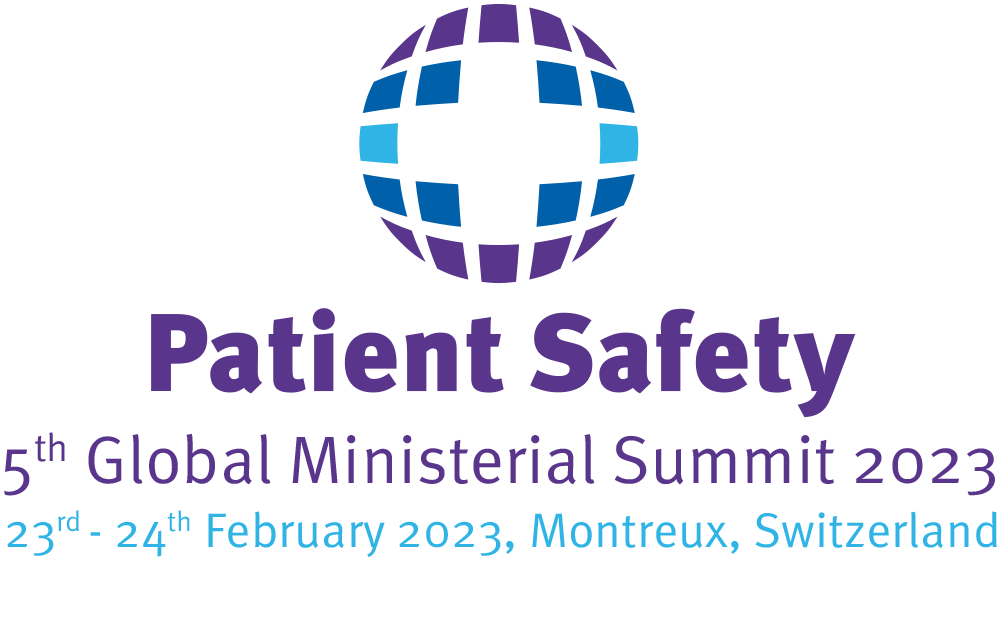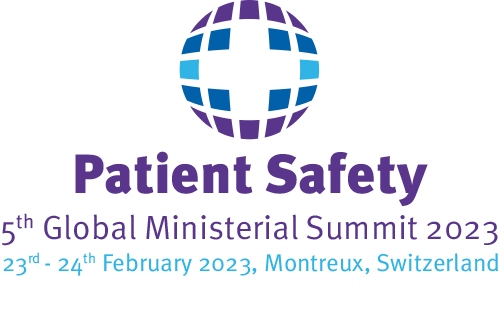Program
5th Global Ministerial Patient Safety Summit 2023
The Summit consisted of two days. The focus of the first day lied on pivotal discussions and contributions provided by international, leading experts in the field of Patient Safety. The second day united ministers from all over the world.
Please find the program also for download
PROGRAM OF EXPERT DAY (23.02.2023)
07.30 – 08.30 h
Arrival & Registration
08.30 – 08.40 h
Plenary Hall
Opening Statement
Anne Lévy (Director-General of the Federal Office of Public Health, Switzerland)
08.40 – 09.00 h
Plenary Hall
Keynote
«Patient Safety: Writing a different future»
Sir Liam Donaldson (WHO Patient Safety Envoy, UK)
09.00 – 09.20 h
Plenary Hall
Keynote
«1st Global Patient Safety Challenge: implementing hand hygiene worldwide, 1995-2023»
Prof. Didier Pittet (Professor of Medicine (hon), Faculty of Medicine, University of Geneva, Switzerland)
09.20 – 09.45 h
Coffee Break & Transfer to breakout rooms
09.45 – 11.15 h
Sessions 1 – 5
11.15 – 11.35 h
Opportunity for transfer between sessions/rooms
11.35 – 13.05 h
Session 6 – 10
13.05 – 14.35 h
Lunch Break & Networking
14.35 – 16.05 h
Session 11 – 15
16.05 – 16.35 h
Coffee Break & Networking
16.35 – 18.00 h
Plenary Hall
Closing Plenary
Keynote
«Implementation science: enhancing the intersection between research and practice»
Prof. Dr. phil. Lauren Clack (Institute for Implementation Science in Health Care, University of Zurich, Switzerland)
Core messages
Roundtable with session chairs, 60-90 seconds pitch each
Closing keynote – “Implementation: Getting everyone on board“
«Implementation: Getting everyone on board»
Dr. Anthony Staines (Fédération des Hôpitaux Vaudois, Lausanne, Switzerland)
afterwards
Transfer to Hotels
Meeting of Chairs of all Sessions
Preparation of the core Messages for the Ministers (Ministerial Segment)
19.30 – 22.30 h
Ministerial Dinner (Head of Delegations only)
Hosted by the President of the Swiss Confederation, Mr. Alain Berset
PROGRAM OF MINISTERIAL DAY (24.02.2023)
07.30 – 08.30 h
Arrival & Registration
08.30 – 08.50 h
Opening Plenary, Plenary Hall
Opening Remarks by the President of the Swiss Confederation, Mr. Alain Berset
08.50 – 09.00 h
Keynote, Plenary Hall
Dr. Tedros Adhanom Ghebreyesus, Director-General, WHO
09.00 – 09.15 h
Keynote “What Needs To Be Done to Improve Patient Safety”, Plenary Hall
Joe Kiani, Founder, Patient Safety Movement Foundation, USA
09.15 – 09.30 h
Core Messages from Experts to Ministers, Plenary Hall
Prof. Didier Pittet, Professor of medicine (hon), Faculty of Medicine, University of Geneva
Dr. Anthony Staines, Fédération des hôpitaux vaudois, Lausanne, Switzerland
09.30 – 10.10 h
Ministerial Panel, Plenary Hall
Ministerial Discussion on «Implementation of Patient Safety & International Cooperation – including in Crisis Situations»
10.10 – 10.50 h
Minister Photo & Coffee Break
10.50 – 11.20 h
Panel of Summit Host Countries, Plenary Hall
Discussion by Summit Host Countries on «Progress and Challenges in Patient Safety – Experiences with the Global Ministerial Summit on Patient Safety»
11.20 – 14.15 h
Ministers’ & HoDs’ Statements, Plenary Hall
14.15 – 14.30 h
Closing Plenary, Plenary Hall
Closing Remarks by the President of the Swiss Confederation, Mr. Alain Berset
14.30 – 15.30 h
Lunch Break & Networking
The Federal Office of Public Health (FOPH) would like to acknowledge its long-standing partners Didier Pittet and Stephan Harbarth (University Hospital of Geneva HUG, Infection Control Program) as well as Anthony Staines (Staines Improvement Research, long-standing consultant of the FOPH on Quality and Patient Safety) for the development of the summit’s program. Several other experts provided valuable contributions: Alaska Yasser (Saudi-Arabia), Arce Hugo E. (Argentina), Benmosbah Lotfi (Tunisia), Boryzkowski Tcheun-How (Switzerland), Buetti Niccolo (Switzerland), Canfield Carolyn (Canada), Dhingra Neelam (WHO), Fevrier Adelia (UK), Galas Murielle (Switzerland), Härtel Ingo (Germany), Kesavan Shaleel (United Kingdom), Lajolo Camila (Brazil), Likaka Andrew (Malawi), Manser Tanja (Switzerland), Marr Carrie (Australia), Metsini Aliki (Switzerland), Rana BK (India), Schwappach David (Switzerland), Sevdalis Nick (United Kingdom), Ushiro Shin (Japan), Vincent Charles (United Kingdom), Zingg Walter (Switzerland).


